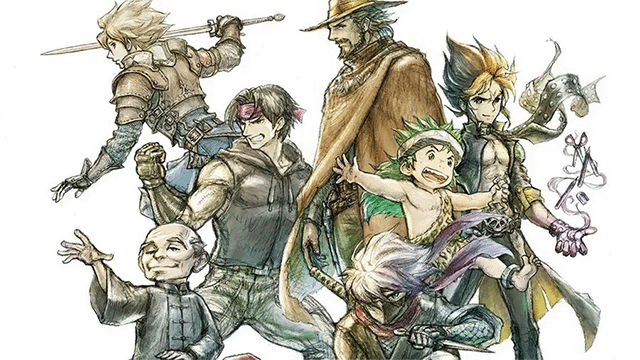The original release of Live A Live came during the golden age of Square. It hit Japanese shelves five months after the release of Final Fantasy 6 and six months before Chrono Trigger launched, but unfortunately, it didn’t make the cut for a wider release.
It’s hard to believe now, but most of Square’s games didn’t make it out of Japan in the mid-1990s, and titles we consider classics now, like Live A Live, only drew attention due to fan translations. Now, it’s finally getting an official release with the Nintendo Switch remake, and the big question we have is if the wait was worth it.
Eight paths, one ending
The premise of Live A Live is similar to the one we’d see later in SaGa Frontier. When the game boots, you can choose between seven chapters, each set in a different time period. These are less connected than in SaGa Frontier, and the only apparent similarity (at first) is that you have to face a powerful foe whose name contains or is similar to “Odio.” Finishing each chapter unlocks an eighth, and completing that one will open the final chapter, which ties everything together.
Some of the time periods are more fun than others, and each has its own quirks. The one set in feudal Japan, for example, has a stealth mechanic that lets you avoid battles with the pitfall that you’re passing up valuable experience points. The Western section has you ordering townspeople to set traps for an invading outlaw gang. If you do this correctly, the final boss will be easier.
Each chapter lasts around 2-4 hours, making Live A Live relatively short for a JRPG. This makes it perfect for players who don’t have a ton of time to game but still want to get some of that classic Square gameplay.
Looking good
The remake’s graphics are by far superior to the original’s. The original Live A Live just isn’t a pretty game. It lacks the impressive sprites we’d see in other contemporary titles, and it has a bit of a generic look to it.
The remake is created in the style of Octopath Traveler and Triangle Strategy. I’d say the sprites are more of an HD version of Chrono Trigger’s style now, and there are impressive modern lighting and depth of field effects that really make everything pop. I’m a huge fan of this style, and it’s a great way to remake a 16-bit game while preserving the art style.
For better or worse
Luckily, not much has changed as far as the meat of the game is concerned. I’ve seen complaints about the new translation, but that’s part and parcel when it comes to Square Enix. Everyone knows that you’re better off playing a fan translation if you want something faithful to the original Japanese.
The gameplay has remained the same, down to the unique pseudo-tactical battle system. The most significant addition is a new radar and in-game tutorial system. Do yourself a favor, though. Turn those off before starting the game. Live A Live has a big concentration on puzzle solving and exploration, and those features absolutely ruin both of those aspects.
The in-game tutorials are especially egregious. Pretty much every puzzle and mechanic is spoiled by a giant pop-up appearing and spelling everything out for you as soon as you encounter it. In particular, there’s a puzzle in the feudal Japan era which requires you to figure out how the guards’ password system works. You get a hint from overhearing an NPC, and then you’re supposed to deduce the answer yourself. However, if you have in-game tutorials enabled, you’ll just immediately get the answer.
There are also little quality of life improvements here and there. The Twilight of Edo Japan and The Distant Future chapters now have maps so you can track where you are. You can also now rechallenge fighters in Present Day in case you miss learning a move. These are small things, but it shows that the team behind the remake was really paying attention.
Nostalgic currency
So, if you’re a fan of Square’s work from the mid-1990s, you’ll want to buy this, right? Well, it’s not really a budget title. Live A Live retails for $49.88, which is a big ask for a game that’s 30 years old, even when it’s been remade.
I personally think it’s worth a purchase at full price. It’s a faithful remake that adds enough quality of life and graphical improvements to make it worth it, even if you’ve played the fan translation before. It’s the classic that never was, and I hope other Square games from that time, like Bahamut Lagoon, Treasure of the Rudras, and Treasure Hunter D, get similar treatment.
However, don’t expect a Chrono Trigger or Final Fantasy 6-level experience here. It’s a quality JRPG, but it’s best to set realistic expectations.
Live A Live Review: The final verdict
Square Enix continues to show it isn’t afraid to take risks with its remake of Live A Live. It’s obviously a smaller-scale project, but the Octopath Traveler treatment is just right for a game like this. So now, 28 years after its release in Japan, we can enjoy its official launch.
Fortunately, it’s not a launch that’s 28 years too late. Live A Live is still full of charm, and the graphics and gameplay have been tweaked just enough to give it some modern touches. Hopefully, it’ll get the recognition it deserves alongside Square’s other classics.
-
Excellent classic JRPG gameplay.
-
Great quality of life improvements.
-
Graphics dramatically improved.
-
New tutorial system spoils puzzles.















